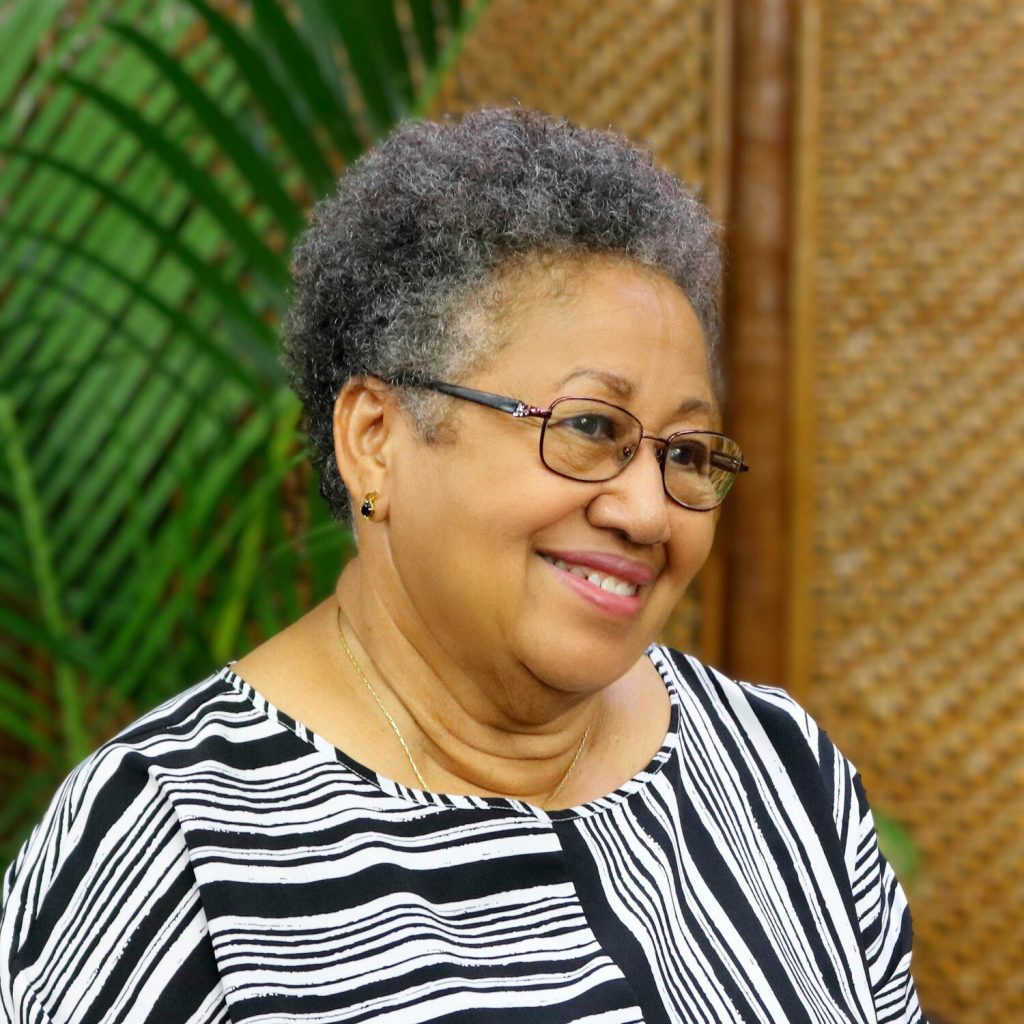When I tell people I like to work in the ground they ask: why would you? You’ll find that in most parts of the region. It’s our heritage to go to school, so you don’t have to dig dirt. Years ago, I used to say that I like plants because they don’t talk back to you. The thing is, if you give plants too much attention of the wrong kind — the same thing happens with people — they don’t do well. You have to make sure that your time with your plants, family, friends and colleagues is time well spent.
I like to know that if I’m growing vegetables and herbs, I can eat them — people find this strange! Tomatoes, different types of lettuce, swiss chard, cilantro, spices, thyme, oregano, and garlic are in my kitchen garden. I like to put the garlic cloves in my salad.
Other than that, I have lots of hanging ferns and anthuriums in pots. I plant a lot of stuff and have a good time dealing with house plants and the garden. I stay grounded through my family, friends and my plants. I have 150 emails flagged for follow-up, but you can’t do it 24/7. You have to stop. When I close my eyes, I sleep.
I have excellent people who work with me. The emails come, I scan, and I know which ones are follow-ups, what I can send out, and they rotate.
I don’t think about balancing. You just do because you can’t allow yourself to be distracted by things that aren’t relevant in the long run. You have to keep understanding what’s happening but focused on what needs to be done daily.
I don’t know if there’s anything in my role that scares me, per se. I think the importance of planning where you want to go and trying to sort out what you need to do to get there is important.
It’s never a case where you can 100% guarantee that everything will be done. But it’s normally the case that if you plan, you have a better chance of getting it done … We have to learn from what we did before in order to do it better next time and actually achieve what we’re setting out to achieve.
Growing up in Corozal — the Belize district bordering Mexico — I spoke Spanish before English. I still speak Spanish, but not as fluently as I used to because though Belize is bilingual, we’re schooled in English. When I go to a Spanish country, it comes back to me quickly, but I wouldn’t tell anyone I’m fluent.
As a child, we moved around a lot because my dad was a policeman and transferred quite frequently across Belize. I got to know my country well, and since becoming an adult I’ve lived in several other CARICOM countries [Jamaica, Barbados, Guyana, and associate member Bermuda], so maybe I am a person who moves a lot.
In Jamaica, I studied economics as a first degree and then did it again for my master’s degree in Canada, so I’ve also lived there for a little while, too. I then returned to Jamaica to do a PhD in social sciences … It’s difficult to solve a problem from one angle. You must understand the other aspects of society, so I went back to school to learn more about social and political sciences.
When I was appointed as Secretary General (SG) for CARICOM, I was proud. It was a pride tempered with the reality that there’s lots of work to be done, so you roll up your sleeves and get to it. Because I was Deputy SG over 20 years ago, people said it’s the natural progression.
If I wasn’t [in Guyana], I’d be in Belize working. When I left two decades ago, I went back home and got involved in economic policy-making, debt restructuring, and public sector policy-making in terms of financial management. We were sorting through some difficult economic and public management times back then.
In this period, I don’t know I’ve been [at CARICOM] long enough to know if I’m doing anything different from my predecessors. I know I’m outward-looking, and that I make an effort to ensure all stakeholders are involved.
I keep on that treadmill that says when you’re trying to find a solution, involve everyone. I’m not sure we’ve been able to do this in the past. It requires a mindset, resources, and a different way of working sometimes.
It’s very challenging to keep it moving, but you have to ensure that you’re bringing everybody onboard and they’re aware of what you’re trying to do. People who are going to be affected should be involved and contribute to the solutions. Also, so they’re not surprised when asked to do something.
Oftentimes, in whatever role we play, we don’t talk to those who need to be involved in the solution and then when the solution gets handed, you have to start over because they should’ve been there from inception.
Truthfully, I think the biggest misconception about our job is that we run CARICOM. We don’t run CARICOM. CARICOM runs us! We’re the administrative hub and the decisions we implement are determined by all member states, various councils, and the various bodies. Then, we organise how to get it done.
This takes time because each state is responsible for implementing them separately.
Of course, national priorities will predominate sometimes — that’s one of the critiques often directed at the integration model chosen.
I’m just like everybody else. My colleagues say I laugh a lot and I’m not serious 100% of the time — you must have space for lightness.
I admire a lot of people. I can’t call any heads of government. Not that I don’t admire them. I do, greatly, but I’m not picking favourites at all.
Someone I deeply admire at home is my mother. She’s 96 and reasonably well, considering all she’s been through, and her focus — that for me is really important. I don’t know if there’s anyone else I’d put at that level at this stage.
Mum would prefer if I was in Belize so I could see her often, but she understands how important my role is, and she admires and feels personal about it because she raised me.
At her age, I don’t know that she follows politics. It’s about the church, grands, great-grands, and making sure that everything is done. She’s left it up to the generations after.
My hope for CARICOM is getting young people to love it. We have to make space so they can get involved, and they have to see it as something that’ll not only benefit them now, but in the future. Getting them involved in what we’re trying to do is very critical.
Wherever I go, I try to meet the young ones, the movers and shakers, and talk a little bit about CARICOM. Find out if they’re interested, and how best they’d receive information.
I’m really excited about CARICOM’s 50th Anniversary Conference (3–6 July) in Trinidad. Later in the year, there’s something I really think could be inspiring — an art competition among young people, which will hopefully turn into an exhibition.
I want to make sure CARICOM is better when I leave here. That it’s stronger, more stable, and there’s greater participation. CARICOM isn’t something separate from us. It’s what we do, where live, what we work within, what we contribute to.
The more of us who get together and work at it, the more effective it’ll be and the more meaningful it’ll be to each of us. It isn’t something that other people do. It is something that each of us should be living. That’s what it is for me.

